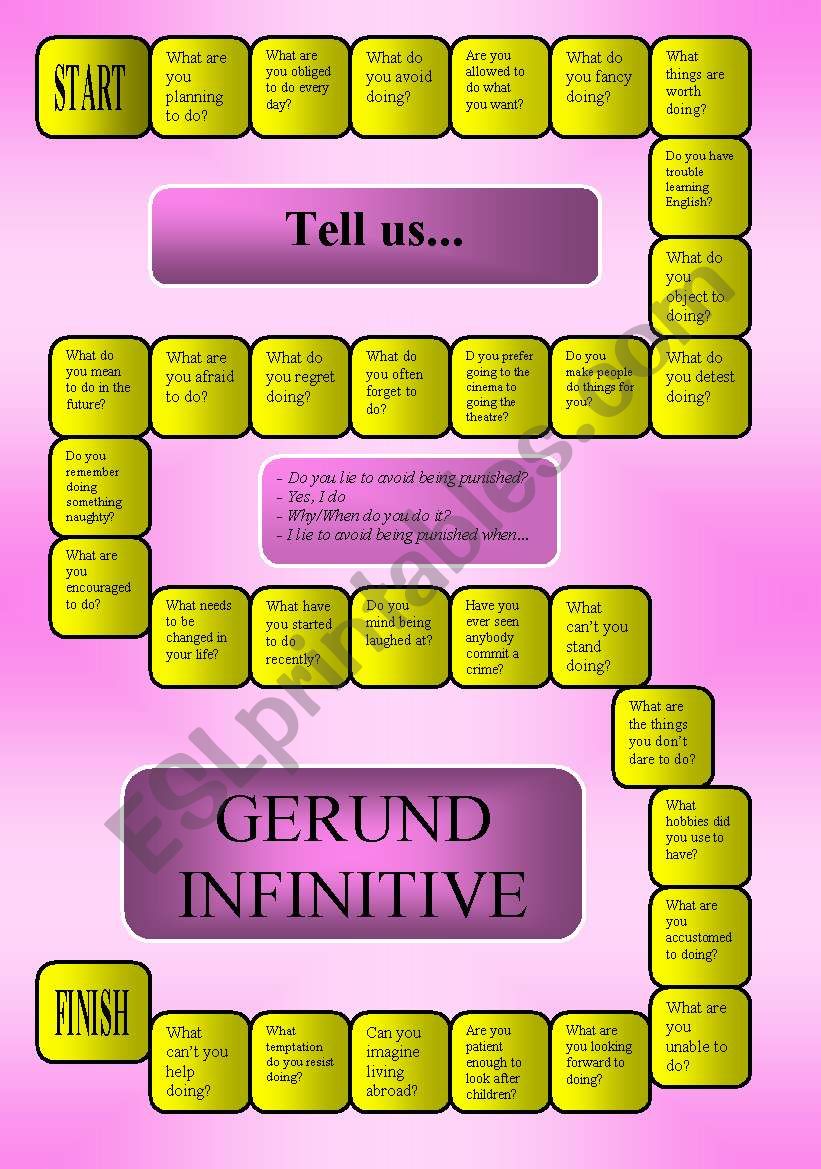Dear students and teachers: Please make sure you subscribe to the free grammar updates here. A gerund is the present participle (-ing) form of the verb. An infinitive is to + the base verb (the verb with no ending). Both gerunds and infinitives are action words (i.e., verbs) in meaning, but they act like nouns in the sentence. They always take a noun position: a subject or an object of the main verb. Dec 19, 2012 A gerund is a noun made from a verb by adding '-ing.' Infinitives are the 'to' form of the verb. It can be tricky to remember which verbs are followed by the infinitive (the to form) of the verb and which are followed by the gerund (the ing form) of the verb. Try to remember that: Gerunds are often used when actions are real, fixed, or completed.
- Gerund Vs Infinitive Games
- Gerund Vs Infinitive Game Download
- Gerund And Infinitive Games Pdf
- Gerund And Infinitive Activities Pdf
Synopsis of English / ESL Video
This creative & engaging animated ESL video teaches learners about gerunds and infinitives (verbs) at the upper-intermediate level. Use this in class and have a blast!
Title of English / ESL Video

Gerunds and Infinitives (Verbs)
Target English Grammar
Gerunds and Infinitives (Verbs):
– Gerund verbs.
– Infinitives with “to”.
– Infinitives without “to”.
Student Proficiency Level
Upper-intermediate level grammar.
Suggested Courses

General English
Instructions
– Play the video in class after delivering a warm-up activity first.
– Pause the video whenever the narrator asks students a question to give students time to answer. For example, after elicitations and concept checking questions (CCQs).
Summary of English Grammar: Gerunds and Infinitives (Verbs)
Approximate chronological order:
Gerunds:
– Elicitation of target grammar.

Form:
– Verb + ing
Function:
– Gerunds act as nouns or pronouns.

Gerund Vs Infinitive Games
Specific Uses:
– Likes/dislikes: I love shopping.
– General activities: I’m good at dancing.
– Abstract ideas: I’m not used to working late.
– When there is no noun to describe something: Catching the train during peak hour is really annoying.
– When speaking or writing in incomplete sentences: What are your hobbies? Watching TV and surfing the Internet.
Use Gerunds:
– As the subject of a sentence: Flying makes me nervous.
– As the object of a sentence: I find listening to music very relaxing.
– After prepositions: The police arrested her for speeding.
– After phrasal verbs: She ended up going to prison.
– After some verbs including: admit, avoid, can’t help, carry on, consider, deny, finish, give up, imagine, involve, keep on, miss, postpone, practice, risk, spend, stop, suggest.
– Example: You should avoid taking a stroll outside during a hurricane.
– After words for expressing like/dislike: can’t stand, crazy about, enjoy, fancy, hate, like/dislike, keen on, love, don’t mind, prefer.
– Example: I love skydiving.
Use Infinitives (with “to”):
– To express a reason or purpose: He ran to avoid being caught.
– After adjectives: This safe is easy to break open.
– After some verbs, including: can/can’t afford, agree, appear, be able to, can’t wait, decide, expect, forget, happen, have (got), help, hope, learn, manage, need, offer, plan, pretend, promise, refuse, remember, seem, teach, tend, threaten, try, want, would like.
– Example: He threatened to hurt the man.
*Infinitives are not generally used as the subject of sentences.
Use the Infinitive (without “to”) after:
– Modal verbs: You should see a doctor.
– Auxiliary verbs: We‘ll go swimming tomorrow.
– let, make and help.
– Example 1: Let‘s go shopping.
– Example 2: Help me carry my shoes.
– Example 3: Sometimes she makes me want to scream!
Negative Forms:
Target language form the negative with “not”:
– Gerunds: I don’t like shopping.
– Infinitives (with “to”): I don’t want to go shopping.
– Infinitives (without “to”): I won’t go shopping.
These verbs can be followed with either the gerund or infinitive (with “to”) with no difference in meaning:
Gerund Vs Infinitive Game Download
– begin, continue, prefer, start. For example:
– I prefer doing yoga.
– I prefer to do yoga.
These verbs can be followed with either the gerund or infinitive (with “to”), but the meaning is different:
– try, remember, forget, need.
– Example 1:
– Try not to hurt yourself again. (This means, make an effort to do something.)
– You should try going to an Italian restaurant. (This means, try something to see if you like it.)
– Example 2:
– Remember to fasten your seatbelt. (This means, don’t forget something.)
– I remember seeing you in high school. (This means, having a memory of something.)
– Example 3:
– I forgot to bring my luggage. (This means, you didn’t remember something.)
– I’ll never forget seeing the beautiful scenery. (This means, you did something and you won’t forget it. It’s more common in the negative form.)
– Example 4:
– You need to buy a new car. (This means, you must do something.)
– That car needs repairing. (This means, the subject needs something.)
*** English / ESL Video: No Music Version ***
Gerund And Infinitive Games Pdf

Gerund And Infinitive Activities Pdf
(5280)